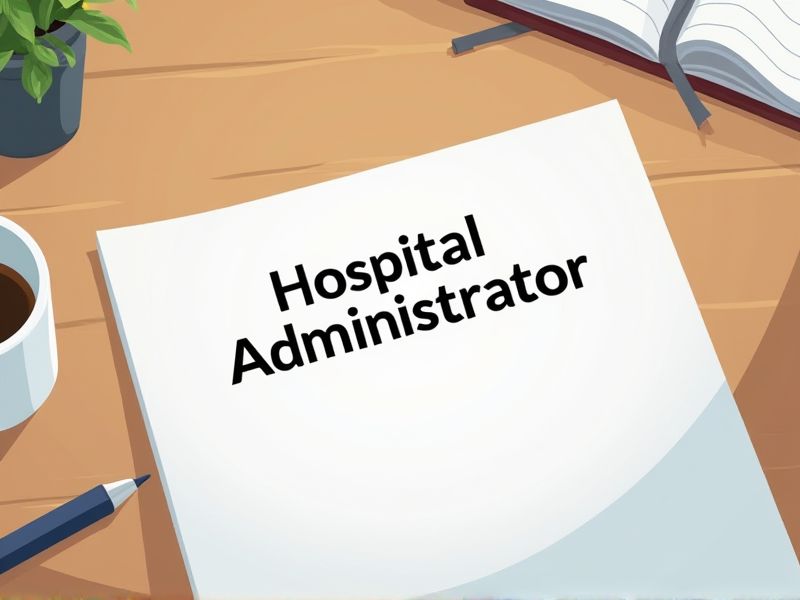
Hospital Administrators play a critical role in ensuring efficient healthcare delivery by overseeing operations, managing budgets, and maintaining compliance with laws and regulations. Certifications can enhance their expertise and credibility, reflecting a commitment to maintaining high standards in healthcare management. They often indicate proficiency in specific areas such as healthcare finance, policy implementation, and organizational leadership. Below are crucial certifications essential for anyone pursuing a career as a Hospital Administrator.
Fellow of the American College of Healthcare Executives (FACHE)
The designation as a Fellow of the American College of Healthcare Executives (FACHE) signals a high level of commitment to professional development and ethical practice, enhancing a hospital administrator's credibility and trustworthiness. Evidence shows that healthcare leaders with FACHE credentials often have superior knowledge of advanced management practices, leading to improved hospital performance outcomes. The FACHE requires continuous education and involvement in the healthcare community, ensuring administrators remain up-to-date on industry changes, which is critical in a rapidly evolving healthcare environment. Earning FACHE status aligns with ensuring quality patient care and operational excellence, which directly influences overall hospital reputation and success.
Certified Medical Manager (CMM)
Certified Medical Manager (CMM) credential enhances a hospital administrator's understanding of medical practice management, ensuring efficient operations. With CMM certification, administrators gain knowledge in financial management and healthcare regulations, leading to better resource allocation and compliance. This expertise facilitates improved communication between the medical and administrative staff, promoting cohesive teamwork. The CMM designation often results in increased credibility and trust from both patients and healthcare professionals, positively impacting the hospital's reputation.
Certified Professional in Healthcare Quality (CPHQ)
The healthcare landscape is increasingly regulated and complex, making a Certified Professional in Healthcare Quality (CPHQ) crucial for Hospital Administrators to ensure compliance with industry standards. The CPHQ credential equips administrators with advanced skills in quality management and process improvement, leading to enhanced patient care and safety outcomes. Hospitals with administrators holding CPHQ often experience more effective resource management and operational efficiency, aligning with organizational and patient needs. The presence of a CPHQ-certified administrator elevates the institution's reputation, fostering trust among patients and stakeholders who prioritize quality and accountability.
Certified Healthcare Financial Professional (CHFP)
Hospitals face intricate financial challenges, making a CHFP's expertise in financial management and strategic planning crucial for optimizing resources. The certification ensures a professional understands regulations and reimbursement processes, reducing financial risk. Hospital administrators with CHFP credentials can better forecast budgets, enhancing operational efficiency. Improved financial acumen from CHFP leads to strategic decision-making that can drive hospital growth and patient care quality.
Certified in Healthcare Compliance (CHC)
Certified in Healthcare Compliance (CHC) ensures that hospital administrators understand intricate healthcare regulations, minimizing legal risks and penalties. Knowledge gained through CHC fosters an organizational culture of ethical practices, which can enhance the hospital's reputation and patient trust. Certification helps administrators implement effective compliance programs, reducing the likelihood of fraudulent activities. Increased regulatory knowledge through CHC allows administrators to better manage resources, ultimately improving operational efficiency.
Certified Professional in Patient Safety (CPPS)
The Certified Professional in Patient Safety (CPPS) credential is needed for hospital administrators because it equips them with specialized knowledge to effectively identify and mitigate risks in patient safety. This certification enhances their ability to implement evidence-based safety protocols, directly reducing the rate of medical errors and enhancing care quality. By holding a CPPS, hospital administrators can foster a culture of safety, which is crucial in maintaining regulatory compliance and securing accreditation. As the healthcare landscape evolves, possessing a CPPS becomes critical in demonstrating a commitment to patient safety and organizational excellence.
Certified Professional in Healthcare Information and Management Systems (CPHIMS)
Hospital Administrators face increasing complexity in managing healthcare information systems, and CPHIMS certification equips them with essential knowledge and skills to address this challenge effectively. Integrating technical expertise and management proficiency, CPHIMS certification ensures Hospital Administrators can optimize IT resources to improve patient care. Health information systems are vital for compliance with regulations and standards, and CPHIMS provides the necessary framework for adherence. Certified Administrators are better positioned to lead digital transformation initiatives, resulting in improved operational efficiency and patient outcomes.
Lean Six Sigma Green Belt - Healthcare Focus
Lean Six Sigma Green Belt with a healthcare focus equips hospital administrators with the tools to streamline operations, effectively reducing inefficiencies and waste. By applying data-driven methodologies, administrators can improve patient care quality and ensure safety standards are consistently met. The skills gained help in addressing cost pressures by optimizing resource use while maintaining financial health. Enhanced process management enables quicker response to healthcare industry changes, thus sustaining competitive advantage.
Project Management Professional (PMP)
A PMP certification equips hospital administrators with essential project management skills that enhance operational efficiency and resource management. Hospitals face complex project demands such as equipment upgrades and facility expansions, requiring structured planning and execution. PMP training provides proven frameworks like Agile and Waterfall, aiding administrators in effectively managing interdisciplinary teams and timelines. The certification increases administrators' credibility and trustworthiness, crucial for securing stakeholder buy-in and leading healthcare initiatives.
Certified Healthcare Administrator (CHA)
Having a Certified Healthcare Administrator (CHA) ensures that hospital administrators are equipped with the necessary skills and knowledge to effectively manage healthcare operations. CHA credentials demonstrate a commitment to adhering to high standards of healthcare practice and ethics, which enhances trust and credibility within the hospital. Certification keeps administrators updated with the latest healthcare regulations and policies, which is crucial for legal compliance and efficient hospital functioning. Employing a CHA can lead to improved patient care outcomes by fostering a well-organized, financially stable, and policy-compliant hospital environment.
Summary
When you obtain certifications as a Hospital Administrator, your credibility and professional value typically enhance. This often leads to improved operational efficiencies and patient care standards within the hospital. The hospital may also experience better stakeholder trust and potentially reduced employee turnover. Such improvements can contribute to the hospital's competitiveness and overall reputation in the healthcare industry.
